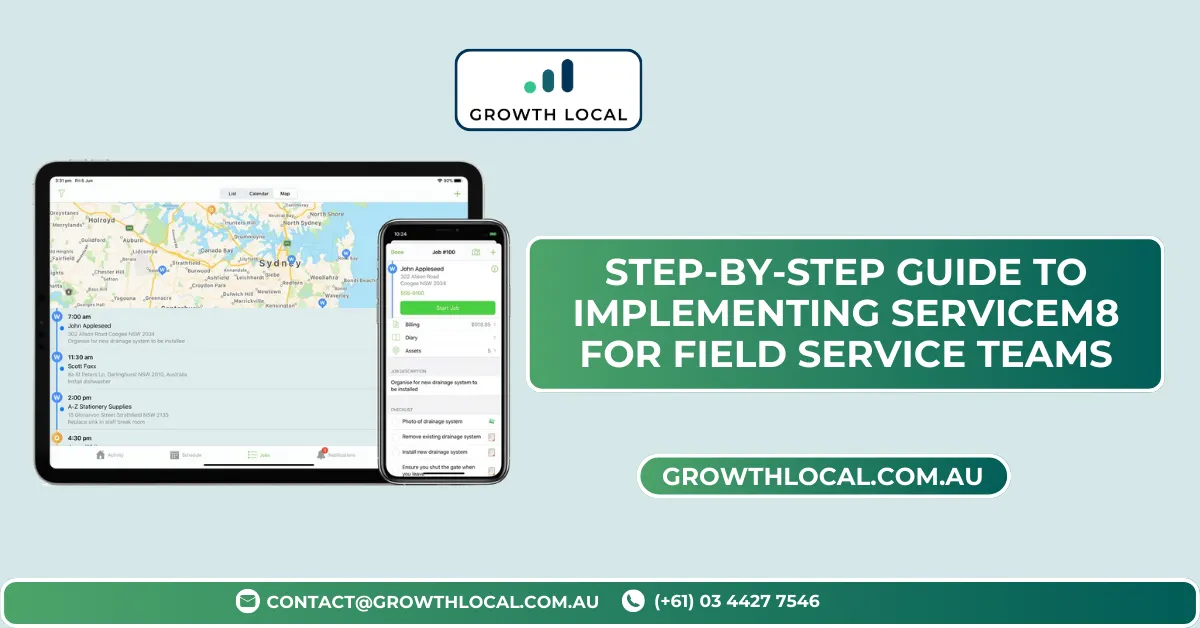
Step-by-Step Guide to Implementing ServiceM8 for Field Service Teams
Field service businesses constantly struggle to keep organisation in daily activities—scheduling jobs, managing staff, tracking customer communication, and authorising invoices appropriately.
Without the right tools, these tasks can spin out of hand. That’s why service teams often rely on ServiceM8, a powerful software program created to make job management easy from start to finish.
In this blog, we'll guide you through a step-by-step ServiceM8 implementation process, from onboarding to setup. We'll also introduce you to how the value of working with a respected partner can assist you when using the platform.
Why ServiceM8?
ServiceM8 is designed specifically for trade and service enterprises. It offers:
Complete job lifecycle management: From booking and quoting to invoicing.
Mobile-friendly functionality: Field staff are able to record jobs, take photos, and sign clients on the spot.
Automation: Reminders, follow-ups, and invoices are automated to save time.
Integrations: Seamlessly integrates with solutions like Xero and QuickBooks.
With the right configuration of ServiceM8, businesses can improve efficiency, reduce admin effort, and boost customer satisfaction.
Step-by-Step Guide to ServiceM8 Implementation
1. Define Your Objectives
Before you start, identify what you want to achieve through ServiceM8. Do you require faster scheduling, better cash flow, or improved customer communication? Having goals ensures that the system is set up as per your business needs.
2. Complete the ServiceM8 Setup
The initial setup entails:
Adding company information and branding.
Setting staff profiles and role-specific permissions.
Setting up service types, categories, and prices.
This step sets the stage for the way that ServiceM8 will function in your business on a day-to-day basis.
3. Work with a ServiceM8 Partner
While ServiceM8 is simple enough to implement, most businesses appreciate the benefit of having a qualified ServiceM8 partner like Growth Local. We will guide you through best practices, establish workflows, and help you avoid missteps when implementing.
4. Import Data for Continuity
Migrating the data you have—client lists, history of jobs done, supplier data—means you'll never risk losing critical information. Smooth data transfer means that your staff finds it easier to get comfortable with the new system.
5. ServiceM8 Onboarding & Training
A successful rollout depends on your staff being able to use the platform confidently. Proper ServiceM8 onboarding should include:
Field staff training on the mobile app.
Office staff training on quoting, scheduling, and invoicing.
Q&A sessions to deal with common issues.
We provide structured onboarding programs to get your team up to speed rapidly.
6. Test and Tweak
Test with small projects to try out workflows. For instance, process a few jobs through ServiceM8, issue invoices, and observe how the system performs. This process reveals gaps and polishes processes.
7. Launch and Track
Once your workflows are optimized, roll out ServiceM8 to all your operations. Track key performance indicators such as reduced job turnaround times, improved payment collection, and improved client communication.
Common Problems with Implementing Service M8
With a simple setup, organizations may still experience:
Resistance from employees to new technology.
Data migration issues.
Misconfigurations of workflows.
These can be overcome through proper training, support, and consultancy from experts.
Benefits of a Successful ServiceM8 Implementation
When implemented correctly, ServiceM8 gives measurable advantages:
Efficiency gains: Less admin time, more time for client service.
Improved communication: Time-zone-independent updates between office and field staff.
Quick payments: Automated invoicing reduces cash flow lag.
Improved client experience: Clients receive timely reminders and professional messages.
FAQs Implementation of ServiceM8
1. How long does ServiceM8 implementation take?
Small businesses can be up and running in a couple of days, although larger companies with complex workflows might take a couple of weeks.
2. Do I need a ServiceM8 partner to get it up and running?
No, but using a ServiceM8 partner such as Growth Local simplifies things and is less likely to go wrong.
3. Is ServiceM8 integrated with my accounting system?
Yes, ServiceM8 also integrates with accounting programs such as Xero and QuickBooks, which simplifies financial management.
4. What support is provided after sign-up?
ServiceM8 provides tutorials and resources, whereas we provide ongoing support, training, and optimisation tailored to your business.
Final Thoughts
Using ServiceM8 can transform the way your field service team operates, but gaining the maximum benefit from your ServiceM8 implementation is dependent upon successful setup, onboarding, and support.
You can maximise the potential of the platform by investing the time to train and, if necessary, getting professional assistance from a ServiceM8 partner like Growth Local.
Streamline your business? Learn more about how Growth Local's ServiceM8 solutions can help your company implement and optimize the system for long-term success.


